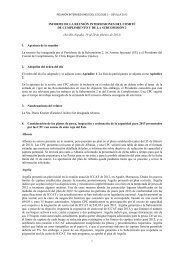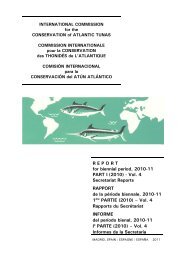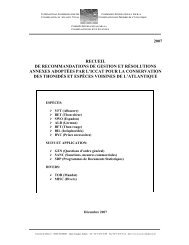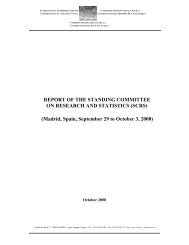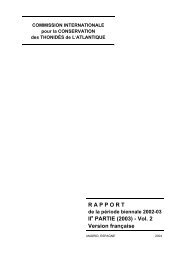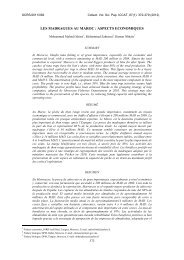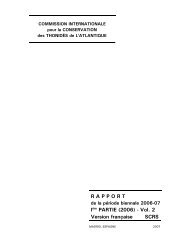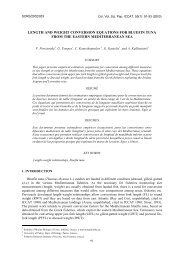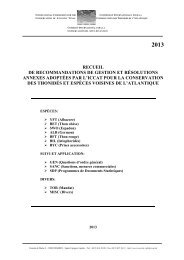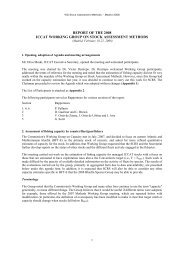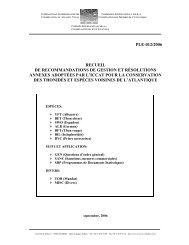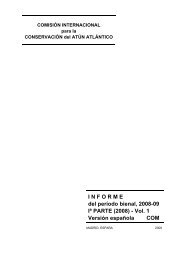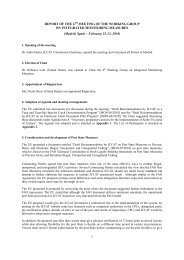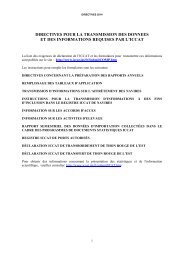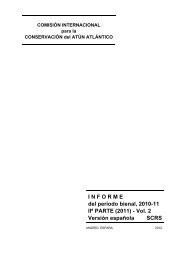E - Iccat
E - Iccat
E - Iccat
Create successful ePaper yourself
Turn your PDF publications into a flip-book with our unique Google optimized e-Paper software.
ICCAT REPORT 2012-2013 (I)<br />
communication. Such communication, however, can be done much more rapidly today. In addition, ICCAT has<br />
been adopting stronger and more comprehensive management measures for a number of the stocks under its<br />
purview to address conservation needs and is likely to continue to do so. Such actions can and have created a<br />
need for an earlier entry into force date given the nature and timing of some fisheries. The Convention has been<br />
understood to allow recommendations to specify entry into force dates that are later than the current 6 month<br />
deadline but not earlier.<br />
Under the circumstances, therefore, reconsideration of the entry into force provisions of the ICCAT Convention<br />
is needed. Specifically, this effort should eliminate unnecessary delays in the entry into force of management<br />
recommendations and support effective stock conservation. Toward that end, any agreed approach must<br />
reinforce the obligation of Contracting Parties to effectively manage their fisheries in accordance with ICCAT’s<br />
conservation and management measures no matter when those fisheries occur. Article VIII, paragraph 2, should<br />
be amended to take these considerations into account. Conforming amendments would be needed in paragraph<br />
3(a) of this same Article.<br />
Objection procedures: Like the entry into force provisions, ICCAT’s objection procedures reflect a time when<br />
international communications were difficult and slow. In addition to being lengthy, they are cumbersome and<br />
can be confusing as recent experience has shown. The process and procedures for lodging objections, therefore,<br />
need to be clarified, modernized, and, if possible, streamlined. Improving the transparency of the objection<br />
process and strengthening their foundation are important goals. Article VIII, paragraph 3, should be amended to<br />
provide, at a minimum, that:<br />
120<br />
♦ An objection should not delay the entry into force for a recommendation for non-objecting Contracting<br />
Parties unless a certain number of Contracting Parties object to the measure;<br />
♦ The objecting Contracting Party must explain the reason for their objection as well as what alternative<br />
measures they will put in place to ensure that the objectives of the ICCAT measure are not undermined.<br />
CPCs could also consider whether the Convention should include a limited number of grounds on which an<br />
objection can be made. The NAFO Convention, SPRFMO Convention, and the new North Pacific Fisheries<br />
Commission Convention provide useful models to consider with regard to improving ICCAT’s objection<br />
procedures.<br />
Voting rules: The current rules create an extremely high bar for adopting measures by vote. To date, voting in<br />
ICCAT has been shown to be an ineffective tool for taking decisions – intersessionally or otherwise. Currently,<br />
two-thirds of ICCAT’s Contracting Parties constitute a quorum; however, the threshold needed to adopt a<br />
measure is a majority of all Contracting Parties in almost all cases. Thus, for a measure to pass, a qualified or<br />
absolute majority of ICCAT’s full membership must vote in favor. Abstentions under ICCAT’s current rules<br />
effectively act as negative votes. Amendments to Article III, paragraph 3, will be necessary to address these<br />
issues, and, at a minimum, should reflect the following:<br />
♦ Decisions should be taken by consensus when possible, but, if all attempts to reach consensus fail, a vote<br />
may be called;<br />
♦ Decisions of the Commission should be based on the votes of those Contracting Parties present and<br />
casting a positive or negative vote;<br />
♦ Conforming amendments to Article 1(b)(i) and ICCAT’s Rules of Procedure.<br />
The SPRFMO Convention may be a useful model in this regard.<br />
Dispute settlement procedures: Currently the issue of dispute settlement is absent from the ICCAT Convention<br />
and Rules of Procedure. Given the potential for disagreements among ICCAT members concerning the<br />
interpretation or application of ICCAT requirements, the addition of an article to the ICCAT Convention<br />
establishing a dispute settlement procedure in line with that provided in UNCLOS/UNFSA should be<br />
considered. Other approaches to this matter, such as through adjustment to the Rules of Procedure, may also be<br />
appropriate.<br />
Participation of non-Parties to the Convention. To enhance ICCAT's ability to manage the resources under its<br />
purview fully and effectively, it is in the interest of all to create better opportunities for Cooperating non-<br />
Contracting Parties, Entities, and Fishing Entities who have significant interests in ICCAT fisheries but who are<br />
not currently able to be members of ICCAT to develop a stronger and more stable relationship with the



